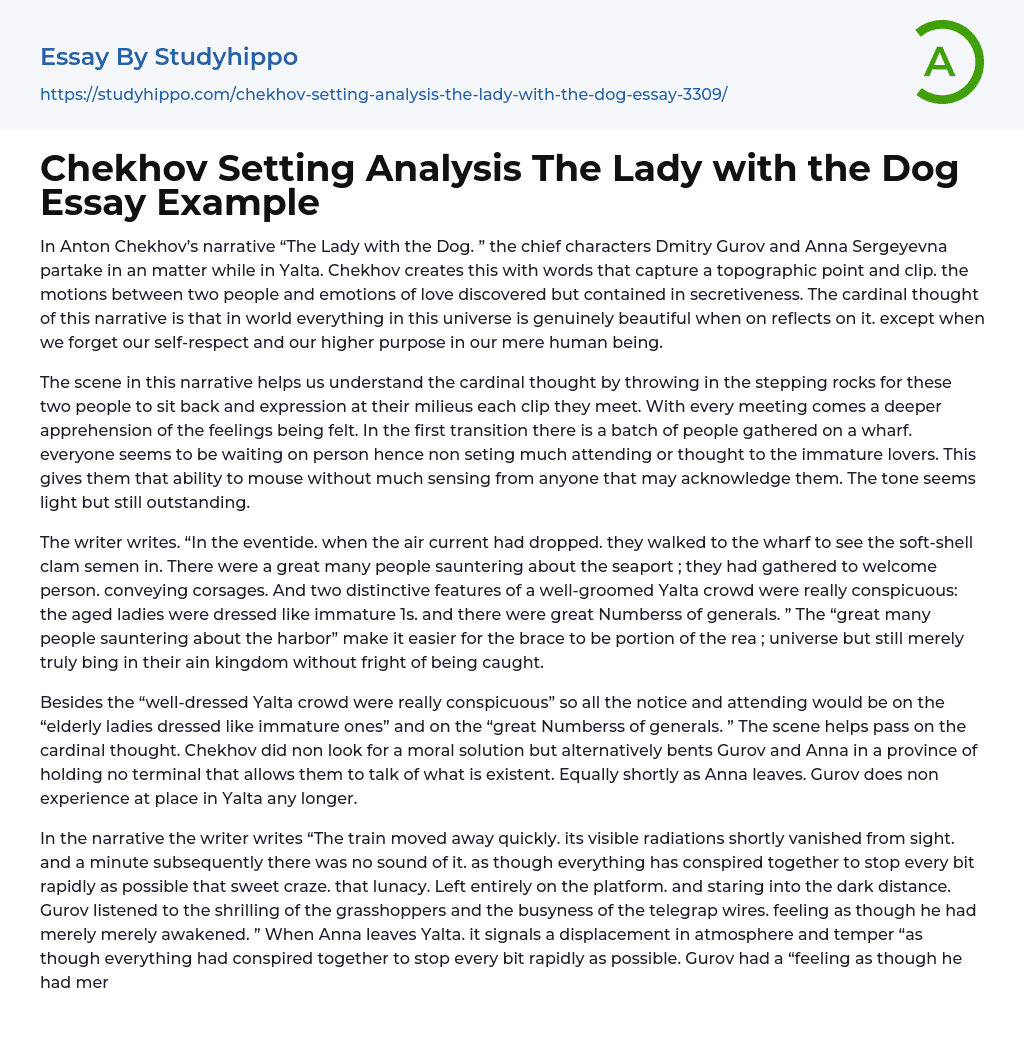

Chekhov Setting Analysis The Lady with the Dog Essay Example
In Anton Chekhov’s narrative “The Lady with the Dog. ” the chief characters Dmitry Gurov and Anna Sergeyevna partake in an matter while in Yalta. Chekhov creates this with words that capture a topographic point and clip. the motions between two people and emotions of love discovered but contained in secretiveness. The cardinal thought of this narrative is that in world everything in this universe is genuinely beautiful when on reflects on it. except when we forget our self-respect and our higher purpose in our mere human being.
The scene in this narrative helps us understand the cardinal thought by throwing in the stepping rocks for these two people to sit back and expression at their milieus each clip they meet. With every meeting comes a deeper apprehension of the feelings being felt. In the first transit
...ion there is a batch of people gathered on a wharf. everyone seems to be waiting on person hence non seting much attending or thought to the immature lovers. This gives them that ability to mouse without much sensing from anyone that may acknowledge them. The tone seems light but still outstanding.
The writer writes. “In the eventide. when the air current had dropped. they walked to the wharf to see the soft-shell clam semen in. There were a great many people sauntering about the seaport ; they had gathered to welcome person. conveying corsages. And two distinctive features of a well-groomed Yalta crowd were really conspicuous: the aged ladies were dressed like immature 1s. and there were great Numberss of generals. ” The “great many people sauntering about the harbor” make it easier for the brace to be portion o
the rea ; universe but still merely truly bing in their ain kingdom without fright of being caught.
Besides the “well-dressed Yalta crowd were really conspicuous” so all the notice and attending would be on the “elderly ladies dressed like immature ones” and on the “great Numberss of generals. ” The scene helps pass on the cardinal thought. Chekhov did non look for a moral solution but alternatively bents Gurov and Anna in a province of holding no terminal that allows them to talk of what is existent. Equally shortly as Anna leaves. Gurov does non experience at place in Yalta any longer.
In the narrative the writer writes “The train moved away quickly. its visible radiations shortly vanished from sight. and a minute subsequently there was no sound of it. as though everything has conspired together to stop every bit rapidly as possible that sweet craze. that lunacy. Left entirely on the platform. and staring into the dark distance. Gurov listened to the shrilling of the grasshoppers and the busyness of the telegrap wires. feeling as though he had merely merely awakened. ” When Anna leaves Yalta. it signals a displacement in atmosphere and temper “as though everything had conspired together to stop every bit rapidly as possible. Gurov had a “feeling as though he had merely merely awakened. ”
And at that minute rapidly decides it’s clip for him to travel north every bit good. The transition reveals how out of topographic point and uncomfortable he feels with Anna gone “standing entirely on the platform and staring into the dark distance. listened to the shrilling of the grasshoppers and the humming of the telegraph wires. ”
Each of these an illustration of something unpleasant reflecting the emotions go oning to develop in Gurov. Anna brought about a softening of his bosom. leting him to love for the first clip in his life.
- Aldous Huxley essays
- Alice Walker essays
- Amy tan essays
- Anne Bradstreet essays
- Anton Chekhov essays
- Arthur Miller essays
- Augustine essays
- Bertolt Brecht essays
- Booker T Washington essays
- Carol ann duffy essays
- Charles Dickens essays
- Charlotte Perkins Gilman essays
- Chinua Achebe essays
- Christina Rossetti essays
- Consider The Lobster essays
- Edgar Allan Poe essays
- Elizabeth Bishop essays
- Emily Dickinson essays
- Ernest Hemingway essays
- F. Scott Fitzgerald essays
- George Orwell essays
- Harper Lee essays
- Homer essays
- James Baldwin essays
- Jane Austen essays
- John Donne essays
- John Steinbeck essays
- Kate Chopin essays
- Kurt Vonnegut essays
- Langston Hughes essays
- Leonardo Da Vinci essays
- Mark Twain essays
- Mary Shelley essays
- Maya Angelou essays
- Nathaniel Hawthorne essays
- Oscar Wilde essays
- Percy Bysshe Shelley essays
- Peter Skrzynecki essays
- Phillis Wheatley essays
- Poets essays
- Ralph Waldo Emerson essays
- Ray Bradbury essays
- Richard Rodriguez essays
- Robert Browning essays
- Robert Frost essays
- Robert Louis Stevenson essays
- Seamus Heaney essays
- Sherman Alexie essays
- Sophocles essays
- Stephen King essays



